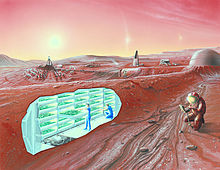
Mundane science fiction (MSF) is a niche literary movement within science fiction that developed in the early 2000s, with principles codified by the "Mundane Manifesto"[1] in 2004, signed by author Geoff Ryman and "The Clarion West 2004 Class". The movement proposes "mundane science fiction" as its own subgenre of science fiction, typically characterized by its setting on Earth or within the Solar System; a lack of interstellar travel, intergalactic travel or human contact with extraterrestrials; and a believable use of technology and science as it exists at the time the story is written or a plausible extension of existing technology. There is debate over the boundaries of MSF and over which works can be considered canonical. Rudy Rucker has noted MSF's similarities to hard science fiction and Ritch Calvin has pointed out MSF's similarities to cyberpunk. Some commentators have identified science fiction films and television series which embody the MSF ethos of near-future realism.
MSF has garnered a mixed reception from the science fiction community. While some science fiction authors have defended the proposed subgenre, others have argued that MSF is contrary to the longstanding imaginative tradition of science fiction, or questioned the need for a new subgenre.
- ^ Geoff Ryman et al. (2004), "The Mundane Manifesto". The manifesto was originally posted to the internet on a site no longer extant, but is available multiple places, such as SFGenics (retrieved 9 Nov. 2021).
